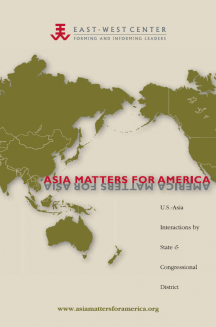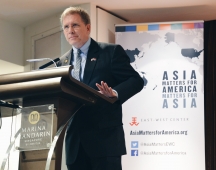On November 14th, on the sidelines of the East Asia Summit in Singapore, the East-West Center launched the newest Asia Matters for America/America Matters for Asia publication, website, and one-page state and Congressional district connection summaries highlighting the mutual business, diplomatic, security, and cultural engagement between the United States and the Indo-Pacific region.

The Asia Matters for America initiative was first launched in November 2008 with the publication of a pamphlet on US-Indo-Pacific relations and a corresponding data website. The initiative was conceived to tell the story of the Indo-Pacific’s impact on the United States at the state and local level online and in print. Updated editions of the pamphlet were produced in 2009 and 2011.
In 2010, the first breakout publication and website were created for ASEAN Matters for America/America Matters for ASEAN. This was followed by booklets on Japan (2010), Australia (2011), and Korea (2011), each with its own dedicated website. The individual sites feature articles on trade and investment; education and cultural exchanges; policy; and security.
In 2012, the website was updated to bring the entire initiative together into one place: AsiaMattersforAmerica.org. A new Asia Matters for America publication followed in early 2013. New editions of ASEAN (2014 and 2017), Korea (2013 and 2018), Japan (2015), and Australia (2015) were also produced, as were US state and Congressional district one-page summaries for ASEAN, Japan, and Korea. The first India Matters for America/America Matters for India was published in 2017 during Indian Prime Minister Modi’s visit to Washington, DC.
To mark the project’s 10th anniversary in 2018, the Asia Matters for America initiative was refreshed with a new mobile responsive website featuring interactive data visualizations, news articles, and digital versions of all of the Asia Matters for America publications. Over the course of the last decade, the initiative has produced 14 print publications, over 1,100 online news articles, and thousands of one-page summaries.
The initiative has also hosted numerous events including launches at Capitol Hill, where 29 different Congressional representatives have spoken; events across the United States in partnership with Sasakawa Peace Foundation USA, and the US-ASEAN Business Council among others; and 15 events in the Indo-Pacific with partners such as the University of Sydney, ISEAS-Yusof Ishak Insitute, and the Korea Institute for International Economic Policy (KIEP).

at the AMA Singapore Launch
At the November launch in Singapore, nearly 100 guests from media, diplomatic, business, academic, and policy analysis communities attended as Dr. Joseph Liow, Professor of Comparative and International Politics, Dean of the S. Rajaratnam School of International Studies, and concurrently, Dean of the College of Humanities, Arts, and Social Sciences, Nanyang Technological University, Singapore, welcomed participants. United States Principal Deputy Assistant Secretary of State for East Asia and Pacific Affairs W. Patrick Murphy delivered the keynote address, followed by a presentation of Asia Matters for America findings and website demonstration from East-West Center in Washington Director Dr. Satu Limaye. The event concluded with a discussion panel that featured Dr. Tommy Koh, Ambassador-At-Large, Ministry of Foreign Affairs, Singapore; former Ambassador Michael W. Michalak, Senior Vice President and Regional Managing Director, US-ASEAN Business Council; Ambassador Piper Campbell, Chargé d'Affaires, U.S. Mission to ASEAN; and was chaired by Associate Professor Ang Cheng Guan, Head of Graduate Studies at the S. Rajaratnam School of International Studies.
Listen to the full discussion:
"[Asia Matters for America/America Matters for Asia] is a very important report. In a concise fashion, it lays out the facts and figures that I believe answers the question of why America is important to us in Asia, and why Asia is important to America," said Dr. Liow. "This is to some extent, diplomatic speak, we make these points often in keynote remarks, but what Satu [Limaye] has given us is hard empirical data which is useful to follow up on these statements by substantiating the depth and the scope of this relationship."
"As the East-West Center report notes, over two-thirds of all the international students in the United States are from the Indo-Pacific region. Vietnam alone now sends nearly 30,000 students annually to the US, putting Vietnam in the top six sending countries for foreign students and demonstrating the remarkable transition from former adversaries to close partners," said Principal Deputy Assistant Secretary Murphy. "The young leaders of this region - including more than 130,000 members of the Young Southeast Asian Leaders Initiative network here in Southeast Asia - are strengthening those ties every day."
"The Asia Matters for America/America Matters for Asia initiative is usable in many ways. It helps build support for caucuses on Asia in Congress as well as an understanding of concrete local connections. It is used by the America Chambers of Commerce from across the region in their Congressional 'door knocks.' It is a resource as well as a platform for state and local officials. It offers an opportunity for American and Indo-Pacific companies to highlight their contributions to jobs and economic development. It is used by media for coverage of US-Indo-Pacific relations, and as an educational tool by teachers for American students," said Dr. Limaye. "In a real way, the Asia Matters for America initiative is a story of collaboration with partners, echoing the aspirations for America's policies in the Indo-Pacific region."
US interactions with the Indo-Pacific include $1.8 trillion in two-way trade and nearly $1 trillion in regional investment that together account for over 3 million American jobs. The United States earns almost $90 billion from tourism and another $25 billion from students from the region. Cultural exchanges also provide enduring connections and facilitate commerce. The Indo-Pacific is home to the world's most dynamic economies and societies, key US allies, and rising strategic partners as well as potential security threats. View more data on the US-Indo-Pacific relationship.
Caitlin Brophy is a Programs Coordinator at the East-West Center in Washington.